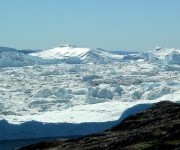This was originally published on TomDispatch and is republished here with Tom’s kind permission.
Lately, I’ve been studying the climate-change induced melting of glaciers in the Greater Himalaya. Understanding the cascading effects of the slow-motion downsizing of one of the planet’s most magnificent landforms has, to put it politely, left me dispirited. Spending time considering the deleterious downstream effects on the two billion people (from the North China Plain to Afghanistan) who depend on the river systems — the Yellow, Yangtze, Mekong, Salween, Irrawaddy, Brahmaputra, Ganges, Indus, Amu Darya, and Tarim — that arise in these mountains isn’t much of an antidote to malaise either.
If you focus on those Himalayan highlands, a deep sense of loss creeps over you — the kind that comes from contemplating the possible end of something once imagined as immovable, immutable, eternal, something that has unexpectedly become vulnerable and perishable as it has slipped into irreversible decline. Those magnificent glaciers, known as the Third Pole because they contain the most ice in the world short of the two polar regions, are ... Read more
